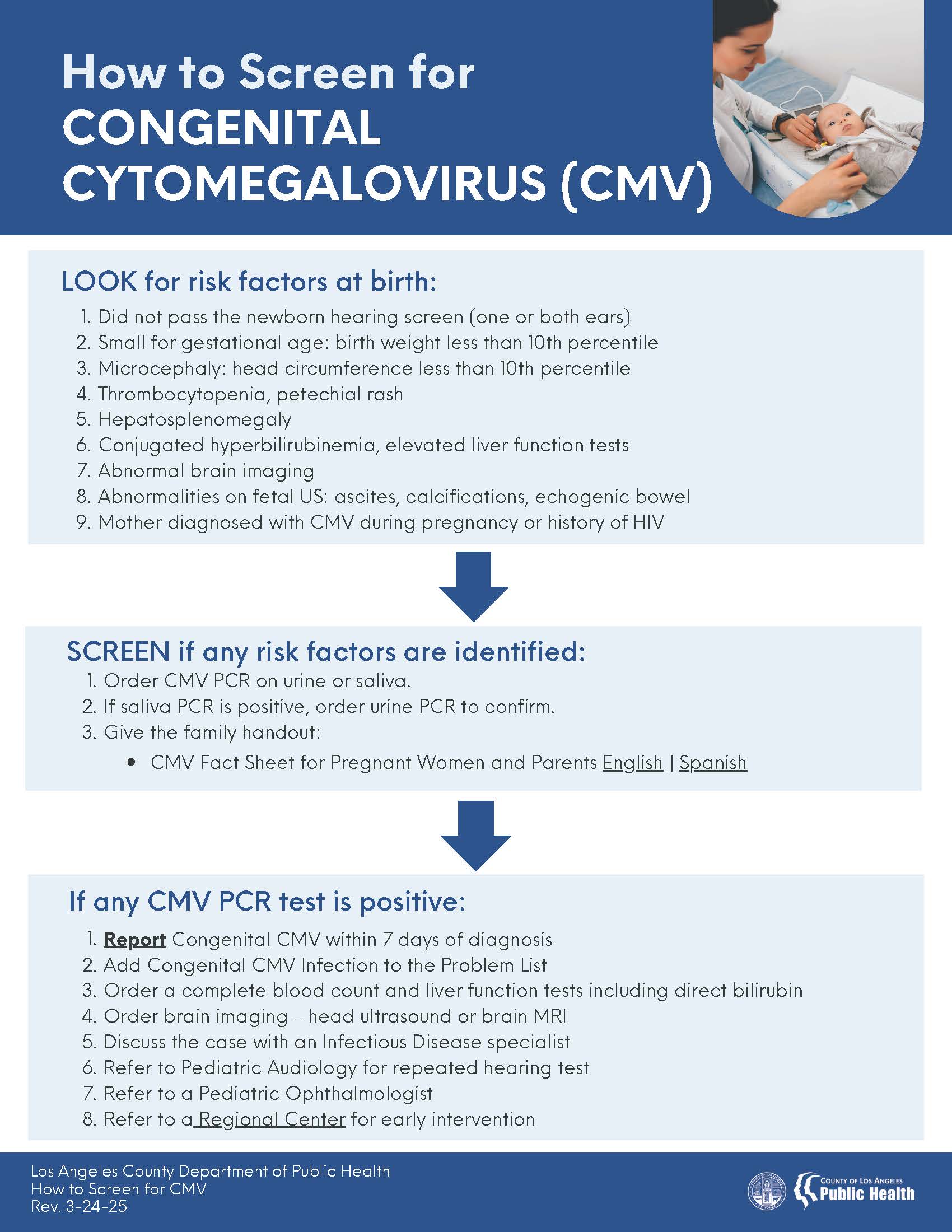Refer to this cCMV screening algorithm for more information.

What is cCMV?
Cytomegalovirus (CMV) is a common virus that can infect people of all ages, including pregnant women and babies. If a pregnant woman is infected with CMV, she can pass it to her developing baby. This is called congenital CMV (cCMV), and it can cause birth defects and other long-term health problems.
Transmission and Prevention
CMV is primarily spread from an infected person from prolonged, direct contact with body fluids. Young children are a common source of CMV. CMV can be present in the saliva and urine of young children months after infection, often without them showing symptoms. Pregnant people become infected most often through close contact with young children or through sexual transmission.
Preventing cCMV transmission involves several key strategies:
- Avoiding contact with saliva when kissing a child
- Not putting a pacifier in their mouth
- Not sharing food, utensils, drinks, or straws
- Not sharing toothbrushes
- Washing hands after changing diapers.
Symptoms and Treatment
Some signs that a baby might have cCMV infection when they are born include:
- Red or purple spots or patches on the skin
- Jaundice
- Small head size
- Seizures
- Liver, spleen, and lung problems
As these signs are not specific, laboratory testing should be conducted within three weeks of birth to confirm cCMV infection. Some babies with cCMV but without signs at birth may still have or develop hearing loss.
Babies with signs of cCMV at birth can be treated with antiviral medications. Treatment may improve hearing and developmental outcomes but should be used with caution due to possible serious side effects.
Children with cCMV should have regular assessments and hearing checks. The earlier they receive hearing checks and therapies, the more they can benefit from them.
Information for Clinicians and Healthcare Professionals
About one out of every 200 babies is born with cCMV. Of these babies, around 1 in 5 will have long-term health problems such as:
- Hearing loss
- Developmental and motor delay
- Vision loss
- Microcephaly
- Seizures
About 15% of babies with congenital CMV will not have signs at birth but will later develop hearing loss. These children do not appear to have other long-term health problems.
Testing for cCMV should be performed in newborns (within the first three weeks of life) if they:
- Have symptoms of cCMV, including:
- Conjugated hyperbilirubinemia, elevated liver function tests
- Hepatosplenomegaly
- Thrombocytopenia, petechial rash
- Microcephaly: head circumference less than 10th percentile
- Small for gestational age: birth weight less than 10th percentile
- Intrauterine growth restriction or abnormalities on fetal US (ascites, intracranial calcifications, echogenic bowel)
- Did not pass the newborn hearing screen (one or both ears)
- Were born to a mother with HIV
- Were born to a mother who tested positive for CMV during pregnancy
Testing for cCMV should be considered in infants at any time during the first year of life if they have unexplained sensorineural hearing loss.
Timing of testing is an important consideration for distinguishing cCMV from postnatally acquired CMV. Ideally, newborn testing should be conducted within three weeks of birth by testing newborn’s urine (preferred specimen) or saliva by polymerase chain reaction (PCR). CMV PCR on blood or plasma samples is not recommended as a first-line test due to the risk of false-negative results. However, a positive PCR from blood or plasma is considered diagnostic for cCMV. At all ages, PCR is the standard lab test used to diagnose cCMV.
cCMV infection cannot be diagnosed with antibody testing (IgG, IgM).
If providers suspect cCMV in an infant more than 3 weeks after birth, dried blood spots (DBS) collected at birth for newborn screening can be used to retrospectively diagnose cCMV. These samples can be requested from the California Newborn Screening Program and sent to a commercial laboratory for CMV DNA detection by PCR.
To request DBS, contact your facility/laboratory should contact the California Newborn Screening Program at CaliforniaBiobankCMV@cdph.ca.gov.
- CDC | CMV Factsheet for HealthCare Providers
- CDC | Clinical Overview of CMV and Congenital CMV for Healthcare Providers
- March of Dimes | Cytomegalovirus and pregnancy
- American Academy of Pediatrics | Congenital Cytomegalovirus (cCMV)
- American College of Obstetricians and Gynecologists | Cytomegalovirus in Pregnancy
Reporting Information
Providers and laboratories are required to report to the Los Angeles County Department of Public Health by electronic transmission (including FAX or email), telephone or mail within 7 calendar days from identification. Contact information can be found below.
Los Angeles County DPH Acute Communicable Disease Control:
- Mail or fax – complete a Confidential Morbidity Report (CMR) form and follow fax, secure email, and mail instructions, or
- Phone – call 888-397-3993 weekdays 8:30am-5:00 pm.
For more information about reporting, click here.
Resources
LAC DPH Resources
- How to Screen for Congenital Cytomegalovirus (CMV)
- Rx for Prevention: Recognizing and Reporting Congenital Cytomegalovirus (4-30-25)
Resources for Parents
- National CMV Foundation
- CDC | CMV Factsheet for Pregnant Women and Parents
- American Academy of Pediatrics What Parents Need to Know About CMV
 Translate
Translate

